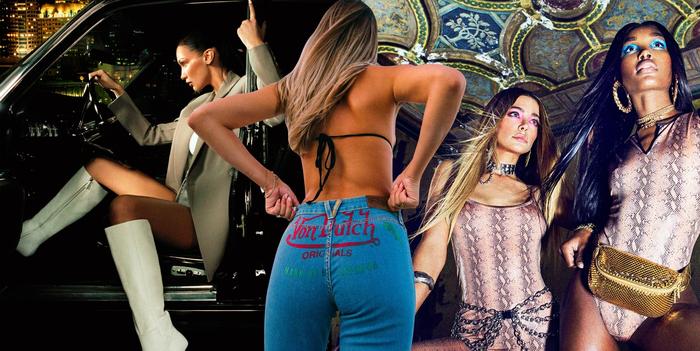Miss Sixty, Baby Phat or Von Dutch: what happened to all those brands from the 2000s that fell into oblivion?
The unwritten laws of fashion say that 20 years is the time that has to pass for a trend to become appealing again. With the deadline met and boosted by the Y2K aesthetic, many 'two-mile' firms orchestrate their return to now conquer Generation Z.
Patricia Rodríguez TOPPhoto: dr1 of 7
MISS SIXTY. The Italian brand was born at the end of the eighties and in a decade it became one of the favorites of characters such as Paris Hilton, Mischa Barton or Hilary Duff. They weren't cheap, but their low (low) waist jeans became ubiquitous in the early 2000s. Precisely in the first decade of the new century, the growth of the firm seemed unstoppable: it launched a division of footwear, glasses, children... but the crisis of 2008 came, Phoebe Philo arrived to increase the size of the pants and the brand failed to adapt. Everything began to fail and, with a debt of 300 million, the owners sold in 2012. Today Miss Sixty is owned by the Chinese group Trendy International and plans to reconquer its market share by signing the network star (and great lover of Y2K) Bella Hadid.
2 of 7
SOLOMON. The brand has benefited from the rise of sports and utility fashion. From the triumph of gorpcore, that aesthetic that elevates mountain looks or the clothes that anyone would wear for hiking. Bella Hadid, once again, has become an unofficial ambassador for this company of French origin that was also acquired by a Chinese group, Anta Sports, in 2019.
3 of 7

TRUE RELIGION. There are not two without three: again Bella Hadid appears as an ally of a brand of the time, but in this case her pull has not been of much use. Like other similar firms, True Religion went through turbulent years after the 2008 crisis and in 2013 it was sold to the investment group TowerBrook (which also controls other labels such as Jimmy Choo). In 2017, he declared bankruptcy but cleaned up his accounts, closed almost 30 stores in the United States and allied himself with Hadid to renew his image. The strategy did not work and in 2020, a few weeks after the outbreak of the pandemic, it declared bankruptcy again. Let no one mourn his loss because he has at least one more opportunity left: a year ago he presented a new reorganization plan to reduce his debt and grow again. Your main asset? Strong brand identity.
4 of 7
VON DUTCH. The American brand has also joined the fever for the first decade of the century to dust off its well-known logo. Now it is called Von Dutch Paris and in its case it tries to erase part of its brand identity: its name was the nickname of Kenny Howard, a man who was dedicated to tuning cars and motorcycles while boasting of white supremacism, anti-Semitism or a certain admiration for the Third Reich. When he died, in 1992, his daughters sold his nickname to a couple of entrepreneurs who set up this firm that now returns with a new creative director and rescuing a bell-bottomed jeans model that had been out of print since 2005. YouTuber Emma Chamberlain gave it a major boost by planting one of his shirts in one of his videos.
5 of 7
BABY PHAT. One of the few of the time that is still in the hands of the same owners. In this case, reality star Kimora Lee Simmons. In 2019 he saw that the trends were favorable to him again and he made a comeback supported by his daughters, who became the image of the campaign. Since then, in addition to lots of velvet, rhinestones and pastels, Simmons has expanded its market with a line of jewelry and a new range of beauty products.
6 of 7
JUICY COUTURE. The return of Juicy's velvet tracksuits has been in the works for several years, ever since Demna Gvasalia used them as an ironic lure in her Vetements collection in 2017. The firm has earned a place among the favorites of the Z and since 2013 it has been part of the portfolio of Authentic Brands, a group that also owns Forever 21, Brooks Brothers or Nine West (another that has triumphed in the years ahead).
7 of 7
ABERCROMBIE & FITCH. The company with the moose logo is trying to modernize itself by renewing its image and shaking off the many scandals it carries. His problem is that his success was based on an aspirational idea that now, luckily, sounds unacceptable and above all very stale: his clothes, as his own CEO said on several occasions, were only made for beautiful people. Handsome and pretty like those shop assistants who walked around their stores in swimsuits. That fantastic spokesman, Mike Jeffries, was responsible for both the rise and the fall of the label and left the post in 2014. The company then accumulated several years with losses from which it has not yet recovered. Last year it closed many of its stores outside the United States (including almost all of those in Spain) and signed a diverse cast for its campaign: the soccer player Megan Rapinoe, the basketball player Kyle Kuzma or the trans actress Leyna Bloom.
Tags: Y2K0 Comments|Rules MoreLessSUBSCRIBE TO PARTICIPATEI already have a subscriptionmost seen
Follow us on
A PRISA Media Grupo Prisa company